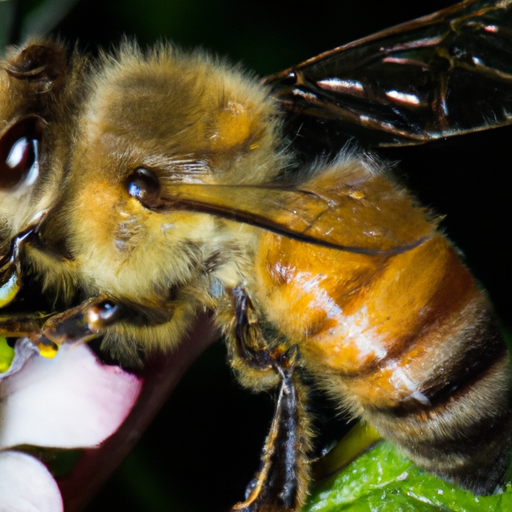
In a recent study led by Pennsylvania State University, researchers have discovered that honey bees inherit altruistic traits from their mother. While many animals do not naturally display altruistic behavior, honey bees prove to be an exception. The study delved into the genetic origins of the “retinue” behavior observed in female worker honey bees and uncovered a fascinating evolutionary contest of genetics that determines from which parent they inherit this trait. This research sheds light on the complex genetic control of altruistic behavior in honey bees and provides insights into their reproductive strategy.
Genetic Origins of Altruistic Behavior in Honey Bees
Introduction
Honey bees are known for their fascinating social behavior, especially their altruistic tendencies. While many animals do not inherently display altruistic behavior, a recent study led by Pennsylvania State University has found that honey bees are a significant exception. This discovery led the researchers to delve into the genetic origins of this behavior and understand the inheritance of altruistic traits in honey bees.
Inheritance of Altruistic Traits in Honey Bees
Altruistic behavior in honey bees is inherited, and the study focused on understanding how genes play a role in this inheritance. The researchers explored the genetic origins of the “retinue” behavior seen in female worker honey bees. They discovered that the genes that heighten the worker bees’ sensitivity to the queen bee’s pheromone are inherited from both parental lines. However, it is only when these genes come from the mother that they lead to altruistic behavior.
Genetic Origins of Altruistic Behavior
To understand the genetic origins of altruistic behavior in honey bees, the researchers conducted research on the “retinue” behavior. They sought to uncover the evolutionary contest of genetics that determines from which parent the bees inherit the altruistic trait. The study revealed that it’s not just the differences in the gene sequences themselves that affect behavior but also which parent the gene is inherited from.
Altruistic Behavior in Honey Bees
Altruistic behavior in honey bees is observed when worker bees encounter the pheromone of the queen bee. In response, they switch off their own reproductive capabilities and focus on caring for the queen and her subsequent brood. This selfless behavior ensures the queen’s optimal reproductive success while the worker bee remains without offspring. This behavior is essential for the hierarchical structure of the hive, where the queen is usually the matriarch of most, if not all, bees.
Worker Bees’ Sensitivity to Queen Bee Pheromone
The queen bee’s pheromone has a significant impact on the behavior of worker bees. It acts as a signal for them to engage in altruistic behavior. The pheromone is propagated among the workers, reinforcing their dedication to caring for the queen and her brood. The sensitivity of worker bees to the queen bee’s pheromone is a crucial factor in their altruistic behavior.
Importance of Genes from the Mother
The study revealed that genes inherited from the mother play a significant role in supporting altruistic behavior in honey bees. Comparison with genes inherited from the father showed that it is the genes from the mother that support altruistic behavior over selfish behavior. This finding aligns with the Kinship Theory of Intragenomic Conflict, which explains the benefits of altruistic behavior in terms of kinship.
Genetic Control of Altruistic Behavior
The research provides evidence of genetic control over altruistic behavior in honey bees. The bees’ behavior is influenced by genes inherited from the queen, their mother. These genes contribute to the worker bee’s support of the queen’s reproduction and suppress their own reproductive capabilities. The genetic control of altruistic behavior ensures the reproductive success of the queen and the survival of her genes in the population.
Reproductive Strategy of Honey Bees
honey bees have a unique reproductive strategy where the queen mates with multiple males, resulting in worker bees having the same mother but different fathers. This strategy has implications for the expression of altruistic behavior. The Kinship Theory of Intragenomic Conflict predicts that genes inherited from the mother will support altruistic behavior in honey bees. Worker bees benefit more from helping their mother and sisters, who carry more copies of the worker’s genes, than from competing with them.
Implications of the Study
This study has significant implications for understanding the genomic battles occurring within honey bee populations. By identifying and mapping the genes involved in altruistic behavior, researchers gain insight into the mechanisms underlying this behavior and its variation within the population. The study also highlights the importance of intragenomic conflict in shaping behavior and other traits. These findings may inspire further research into intragenomic conflict in other plant and animal species.
Methods Used in the Study
The study employed various methods to investigate the genetic origins and inheritance of altruistic behavior in honey bees. Cross-breeding of six distinct honey bee lineages was performed to assess the impact of gene inheritance. This cross-breeding, although challenging with insects, allowed researchers to study the offspring’s behavior and gene expression. The evaluation of worker bees’ response to the queen’s pheromone and RNA sequencing for gene expression analysis were additional techniques used in the study.
In conclusion, the genetic origins of altruistic behavior in honey bees have been a subject of interest for researchers. Understanding how genes influence this behavior and the importance of genes inherited from the mother sheds light on the complex social dynamics of honey bee colonies. This study provides valuable insights into the genetic control of altruistic behavior and the reproductive strategy of honey bees.